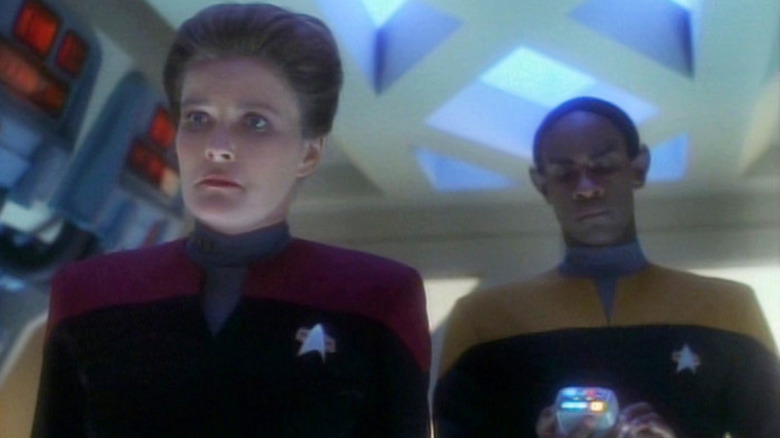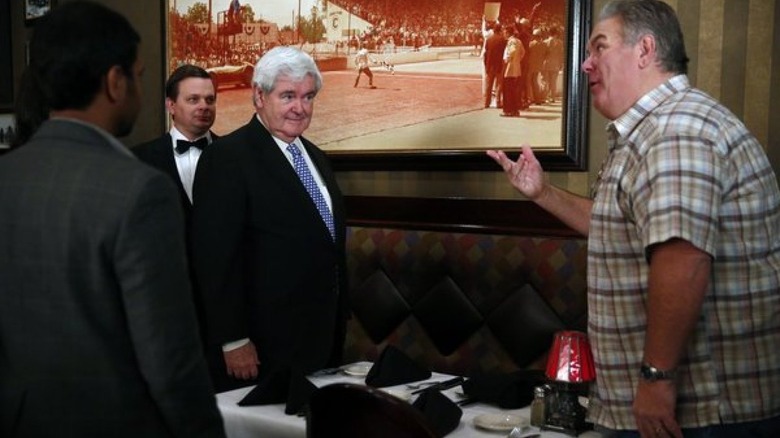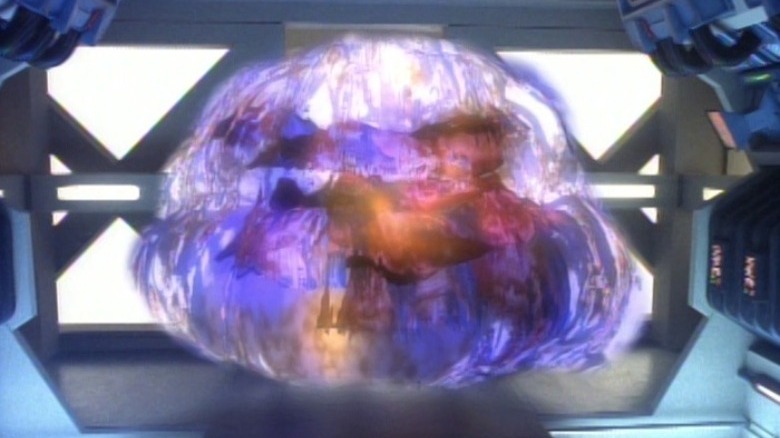How Star Trek: Voyager Got Swept Up In A Newt Gingrich Controversy
In "Caretaker," the 1995 pilot episode of "Star Trek: Voyager," the show's titular ship is instantly whisked across the galaxy by an ineffably powerful space alien called the Caretaker. It seems the Caretaker was scanning the entire galaxy looking for lifeforms that it might be able to reproduce with, hoping to produce a progeny to continue its work. Many years ago, the Caretaker's technology accidentally destroyed the planet of a gentle, innocent species called the Ocampa, and he'd been using his technology to care for the survivors ever since. The Ocampa now live sheltered underground, while the Caretaker needs an heir to take over caretaking duties before he dies in less than a day.
Captain Janeway (Kate Mulgrew) recognizes that when the Caretaker dies, some local ruffians called the Kazon will instantly plunder his technology and potentially wreak galaxy-wide havoc. Janeway chooses to destroy the Caretaker's massive home satellite rather than let it fall into the wrong hands. In doing so, however, she leaves the U.S.S. Voyager and its crew stranded 70 years from Earth. The series follows their quest to return home.
Once can see themes of self-reliance readily apparent in the story of "Caretaker." Not only will the Ocampa have to learn to live on their own without an all-powerful nanny, but the Voyager crew will have to learn to operate without a nearby Starfleet force to back them up. One might even say "the nanny state" is being killed.
The makers of "Voyager" were very aware of the political messages in "Caretaker," although they might have been misinterpreted. Indeed, in the oral history book "Captains' Logs Supplemental: The Unauthorized Guide to the New Trek Voyages" edited by Mark A. Altman and Edward Gross, show co-creator Jeri Taylor noted that "Caretaker" arrived just after Newt Gingrich's draconian Contract With America.
Newt Gingrich's Contract with America
Newt Gingrich served as Speaker of the House of U.S. Representatives from 1996 until 1999, and was known for his extreme right-wing policies and weird speeches about conservative values. During the 1994 midterm elections, the American Republican Party authored a pointed legislative agenda called the Contract with America, mostly cribbing from speeches made by Ronald Reagan and using input from the evil Heritage Foundation, a shadowy right-wing think-tank. The Contract sought to make multiple sweeping bureaucratic reforms, with each of its many sections presented with a sensationalist title. Example: there was the "Take Back Our Streets Act," which added money to police and prisons.
Most notably to the makers of "Voyager," the Contract contained the Personal Responsibility Act, which sought to erode welfare. A lot of right-wing rhetoric at the time — and to this day — is critical of welfare, often stating that the government oughtn't send aid to its citizens without them having to earn it first; it's all based on a long-debunked political theory that welfare ought to be linked to an ineffable puritan work ethic. Gingrich talked a lot about how the government isn't a caretaker and that people should learn to live without aid. Self-reliance, etc.
The pilot of "Star Trek: Voyager" is about destroying a Caretaker and letting childlike citizens finally grow up on their own — to take control of their society with hard work and devotion.
Taylor noted the parallels and was a little miffed that her story of personal responsibility was co-opted by Gingrich. "I think that we were certainly cognizant of the issue of taking responsibility for oneself," she said. "It was after that the whole Newt Gingrich Contract with America issue came along, and, unfortunately, in my mind they have been lumped together."
Voyager's pilot was about maturity, not self reliance
Taylor noted that the story of "Caretaker" was about maturity. Indeed, "Caretaker" was more like a Garden of Eden story told through a sci-fi lens. The Caretaker was a coddling godlike alien who left his children overprotected. When God died, Janeway destroyed his ability to influence others. The story of "Caretaker" falls in line with a lot of the post-religious themes that appear throughout "Star Trek." Taylor liked telling a story of growth and responsibility. It was unfortunate, she felt, that Gingrich's Contract co-opted a lot of those messages:
"I think we weren't talking about anything as drastic and draconian as he seems to be; we were thinking as speaking to our children and saying you must learn to take responsibility for yourselves. If we do too much for you, this does not prepare you to go forth into the world. Now, of course, many people assume that we are part of the New Right, which is anything but the truth."
"Caretaker" was not telling a story about destroying Big Government and teaching citizens Self Reliance.
Indeed, "Star Trek" has been notoriously left wing since the start, often promoting ideas of multiculturalism and speaking out against war and military might. "Star Trek" is post-capitalist and sees no need for religion. Resources are shared openly in the Federation, with Starfleet freely delivering supplies around the galaxy as they are needed. Gene Roddenberry himself was an incredibly left-leaning fellow and had many very liberal ideas about equality within society. Some might see some right-leaning imagery in the militarily-constructed Starfleet, but "Star Trek" never promoted any sense of class-like hierarchy.
If Janeway's ending speech about personal responsibility sounds Gingrichian, know that Jeri Taylor didn't write it that way. She was talking about maturity, not government oversight.


